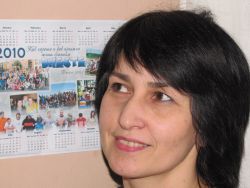Within the framework of project the participants received the theoretical knowledge of how to use the international and European human rights mechanisms and how to work with the legal standards at the national level. The final conference provided the participants with the opportunity to practically demonstrate their knowledge: they were able to apply acquired skills during the moot court, to submit plans for advocacy campaigns on the implementation of international standards at the national level, to share their success in this area, to get practical advice and learn from the experiences of their colleagues.
Dzina Shautsova (right), national coordinator of the "Electronic Human Rights  Education for Lawyers" project in Belarus, noted that system knowledge of the international instruments for human rights protection is essential for Belarusian lawyers. It largely influences the professional growth of the participants: "One of our graduate, who is a lawyer, told me, that she had come to the course in order to obtain system knowledge in this field, as she felt a lack of knowledge to have a possibility to argue their position in the cases with which she worked.She confirmed that she learned a lot. She also said, that if she had a possibility to re-write the complaint she lodged to the United Nations Human Rights Committee, she would do it after the participation in the project. " Thus, participation in this course gives lawyers clarity in understanding the roots of the law violations and the ability to see the problem more deeply in the light of international standards."For a lawyer it is important not only to understand and intuitively feel the problem, describing it in general language, but also to explain his or her position competently and clearly in such a way that can be comprehended by professionals – judges and lawyers, who work on the cases," – said Dzina Shautsova.
Education for Lawyers" project in Belarus, noted that system knowledge of the international instruments for human rights protection is essential for Belarusian lawyers. It largely influences the professional growth of the participants: "One of our graduate, who is a lawyer, told me, that she had come to the course in order to obtain system knowledge in this field, as she felt a lack of knowledge to have a possibility to argue their position in the cases with which she worked.She confirmed that she learned a lot. She also said, that if she had a possibility to re-write the complaint she lodged to the United Nations Human Rights Committee, she would do it after the participation in the project. " Thus, participation in this course gives lawyers clarity in understanding the roots of the law violations and the ability to see the problem more deeply in the light of international standards."For a lawyer it is important not only to understand and intuitively feel the problem, describing it in general language, but also to explain his or her position competently and clearly in such a way that can be comprehended by professionals – judges and lawyers, who work on the cases," – said Dzina Shautsova.
During last year the Belarusian project participants were obtaining knowledge, performing the course tasks, and now they have an opportunity to apply it in their practice, dealing with the current problems in the sphere of human rights. It is also worth noting the joint initiative of the Belarusian participants, who developed a plan of implementation the standards of a fair trial as the result of arbitrary detentions and related administrative cases. "This is a response to a real and serious problem in Belarus. Applying the gained knowledge, several participants were able to develop a plan for dealing with this problem, which is being implemented to date," said Dzina Shautsova.
In addition, Dzina Shautsova, the national coordinator of the project "Electronic Human Rights Education for Lawyers" in Belarus, noted that not only advocates and lawyers from the capital participate in the project, but also the representatives of the regions, "I am very pleased that we have people from the regions. For example, Mikalai Sharakh from Polatsk, a graduate of the first phase of the project, organized a small educational project, which helped him to share information on international mechanisms for the protection of violated rights. At this phase Mikalai Sharakh, together with Yury Stukau and Yury Belski, graduates of 2013, is planning to join efforts and work together on joint initiatives."
Noting the success of graduates of the project, the national coordinator Dzina Shautsova said, that teamwork and mutual support of participants in the project will lead to visible and significant results: "No matter how difficult it is now, I believe that moving step by step, working and supporting each other, we can soon see the results. Because as the saying goes – the night is especially dark before the dawn "
***
The Electronic Human Rights Education for Lawyers (EHREL) is a project under the Human Rights House Network program "International Law in Advocacy" prepared and implemented in cooperation with Human Rights House Foundation’s partner organizations.
The project is designed to bring lawyers from CIS countries together via online human rights training material prepared by international and national experts. The learning process is supervised by a team of managers, regional partners and coordinators.
The project facilitates efforts to fulfill commitments made within the framework of the United Nations, the Council of Europe and other international organizations to support implementation of human rights (HR) obligations in the Commonwealth of Independent States (CIS) countries.
Related articles
Disbarred Belarusan lawyers support Ukrainian colleagues
Participants of ILIA project fight the problem of torture in Moldova
Belarusian participants of ILIA project considered the best lawyers of the year





